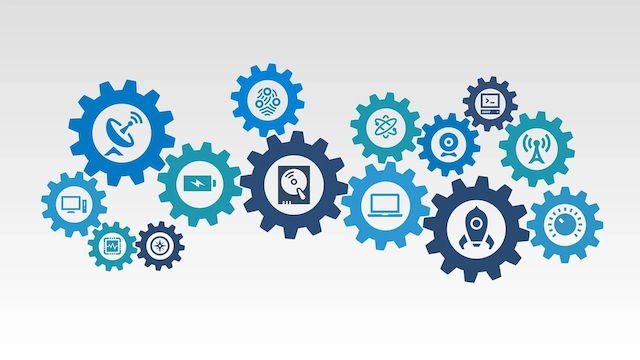Imagine running your business with greater efficiency, smoother operations, and increased productivity. Thanks to modern technology, this isn’t just a dream, it’s a reality. From automating repetitive tasks to streamlining communication, technology is reshaping the way businesses operate on a day-to-day basis. Let’s dive into how you can harness technology to manage your business more effectively.
Resource Planning
In the realm of resource planning, technology offers an unparalleled edge. Business technologies such as Enterprise Resource Planning (ERP) systems enable businesses to integrate various functions into a unified system. Successful entrepreneurs can explain to you how mastering ERP administration allows for real-time tracking and management of resources, whether they are financial, human, or physical assets. With a comprehensive birds-eye view of all resources, decision-makers can efficiently allocate resources, identify bottlenecks, and predict future resource requirements.

Moreover, technology can automate routine resource management tasks, freeing up managers to focus on strategic decision-making. It also supports data-driven decisions, reducing guesswork and inaccuracies. Additionally, cloud-based ERP systems offer flexibility and accessibility, allowing for resource management from anywhere at any time. In turn, this leads to improved organizational agility and responsiveness. Thus, technology plays an instrumental role in managing resource planning, optimizing operational efficiency, and driving business growth.
Communication
Business technology significantly enhances communication management, fostering collaboration and efficiency. Tools like emails, instant messaging apps, and video conferencing platforms enable seamless, real-time communication across different geographical locations. They break down barriers of distance, allowing teams to collaborate as if they were in the same room. Moreover, project management software helps coordinate tasks, deadlines, and progress updates, keeping everyone on the same page.
Communication technologies also support information sharing, ensuring that the right information reaches the right people at the right time. Cloud-based document management systems enable secure, simultaneous access to critical documents, promoting transparency and informed decision-making. Additionally, technology allows for streamlined customer interactions through CRM systems, chatbots, and social media platforms, improving customer service and satisfaction. Therefore, business technology plays a pivotal role in managing communication, promoting productive teamwork, and enhancing customer relations.
Automated Task Management
There are tons of different tasks that a business can automate these days in order to save time and money. Here are some of the most common ones:
- Appointment scheduling
- Invoicing and billing
- Payroll processing
- Expense tracking
- Social media posting
- Customer support and chatbots
- Inventory management
- Marketing automation
- Content distribution
- Data backup and recovery
- Employee onboarding and HR processes
- Lead generation
- Surveys and feedback collection
- Email marketing segmentation
- Workflow automation
- Order processing
Business technology plays a critical role in managing automated tasks, driving efficiency, and enhancing productivity. Tools like Robotic Process Automation (RPA) can handle repetitive, rule-based tasks, freeing up employees to concentrate on strategic, value-added activities. Furthermore, automation software can perform tasks with consistent accuracy, reducing errors and improving process quality.
Additionally, technologies like Artificial Intelligence and Machine Learning can be integrated into business systems to enable intelligent automation, where tasks are not just automated but also optimized over time. The result is a streamlined operation that saves time, reduces costs, and boosts overall business performance.
Customer Relationship Management
CRM software consolidates customer data into one database, offering a holistic view of customer interactions across different channels. This allows businesses to personalize engagement, improve service quality, and anticipate customer needs. Additionally, analytical tools within CRM software can identify patterns and trends in customer behavior, aiding targeted marketing and sales strategies.
Technologies such as chatbots and virtual assistants facilitate 24/7 customer service, enhancing customer experience and satisfaction. Meanwhile, social media platforms provide an avenue for direct communication and feedback, nurturing customer relationships and fostering brand loyalty. Thus, technology plays a vital role in managing customer relationships, driving customer retention, and promoting business growth.
Inventory and Supply-chain Management
For inventory management, technologies like Radio Frequency Identification (RFID) and barcode scanning enable real-time tracking of inventory levels, minimizing the chances of overstocking or understocking. Furthermore, cloud-based inventory management systems provide immediate, universal access to inventory data, facilitating timely decision-making and reducing the risk of stockouts or excess stock.
In terms of supply chain management, technologies like blockchain and the Internet of Things (IoT) enable accurate, real-time tracking of goods as they move through the supply chain. This enhances transparency, reduces fraud, and ensures compliance with regulatory standards. Additionally, predictive analytics can forecast demand, helping businesses optimally manage their supply chain and inventory levels. Overall, technology plays a crucial role in inventory and supply-chain management, streamlining operations, reducing costs, and enhancing customer satisfaction.
Analytics and Reporting
Business technology greatly enhances analytics and reporting, driving informed decision-making and strategic planning. Tools like data management platforms aggregate and organize data from various sources, providing a comprehensive view of business operations. Analytical software, powered by AI and machine learning, can sift through this information to identify trends, patterns, and insights that might otherwise go unnoticed. Real-time reporting tools offer instant access to key business metrics, facilitating timely and proactive decision-making.
Furthermore, visual data representation tools like dashboards and heat maps make complex sets easily understandable, aiding in the interpretation and communication of insights. In effect, technology turns raw data into actionable intelligence, enabling businesses to understand their performance, identify opportunities for improvement, and make data-driven decisions.
Project Management
Project Management Software (PMS) provides a centralized platform where tasks, deadlines, and project progress can be tracked in real-time. These tools facilitate efficient collaboration among team members, irrespective of their physical locations, and enhance communication, ensuring everyone stays updated. Additionally, risk and resource management modules within such software aid in optimally allocating resources and mitigating project risks.
Moreover, AI-powered predictive analytics can identify potential bottlenecks and provide forecasts, enabling proactive decision-making. Integrated reporting functions also make it easy to generate progress and performance reports for stakeholders. Hence, business technology plays a pivotal role in facilitating efficient project planning, execution, and monitoring, leading to improved project outcomes.

In the ever-evolving business landscape, leveraging technology has become a necessity rather than an option. By incorporating tech tools into your daily operations, you can automate tasks, manage customer relationships, streamline inventory, make informed decisions, and oversee projects effectively. Remember, technology is not just about cutting costs but elevating your business to new heights of efficiency and productivity. Don’t hesitate to embrace it, as the benefits are truly transformative.